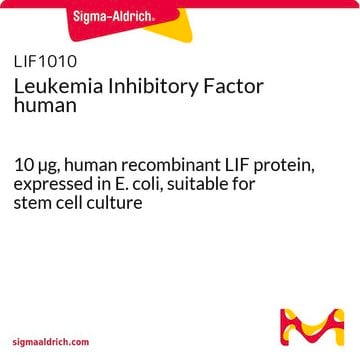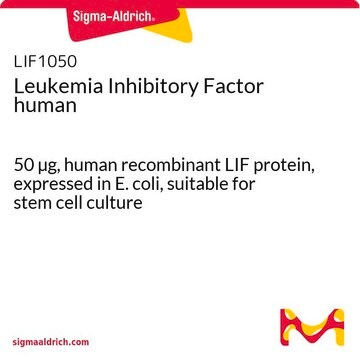SRP9001
Leukemia Inhibitory Factor
human, recombinant, expressed in HEK 293 cells
Sinónimos:
Differentiation-stimulating factor, Emfilermin, LIF, Melanoma-derived LPL inhibitor
About This Item
Productos recomendados
biological source
human
Quality Level
recombinant
expressed in HEK 293 cells
assay
≥95% (SDS-PAGE)
form
liquid
potency
≤0.5 ng/mL M1 cells proliferation inhibition EC50
mol wt
20 kDa
packaging
pkg of 10 μg
technique(s)
cell culture | mammalian: suitable
impurities
≤1 EU/μg protein Endotoxin level
UniProt accession no.
storage temp.
−20°C
Gene Information
human ... LIF(3976)
General description
Application
Biochem/physiol Actions
Physical form
Preparation Note
Storage Class
12 - Non Combustible Liquids
wgk_germany
WGK 1
flash_point_f
Not applicable
flash_point_c
Not applicable
Certificados de análisis (COA)
Busque Certificados de análisis (COA) introduciendo el número de lote del producto. Los números de lote se encuentran en la etiqueta del producto después de las palabras «Lot» o «Batch»
¿Ya tiene este producto?
Encuentre la documentación para los productos que ha comprado recientemente en la Biblioteca de documentos.
Artículos
Read article on hematopoietic cytokines and hematopoiesis
Nuestro equipo de científicos tiene experiencia en todas las áreas de investigación: Ciencias de la vida, Ciencia de los materiales, Síntesis química, Cromatografía, Analítica y muchas otras.
Póngase en contacto con el Servicio técnico






